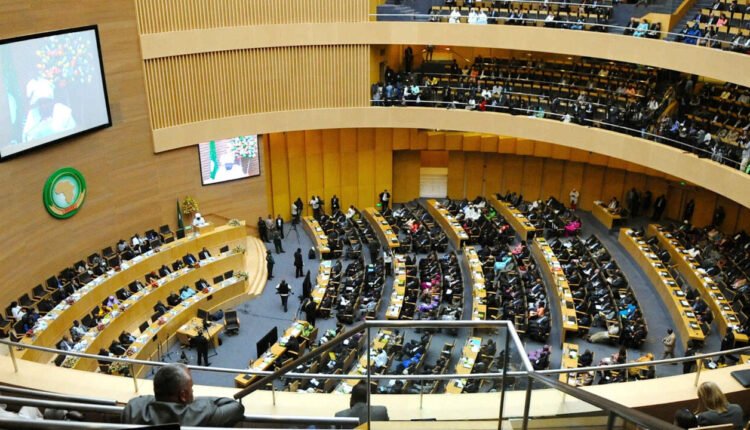Sudanhorizon Uncovers The Corridors of the AU Summit: Odinga’s Position and the Fate of the Humanitarian Support Conference

Cairo – Sudanhorizon – Sabah Musa
The 38th African Union Summit garnered significant attention due to the importance of its agenda, which included the election of the AU Commission Chair, the controversy surrounding the UAE-organized humanitarian support conference for Sudan, and questions about lifting Sudan’s suspension from the AU.
The Race Decided
The voting process for the AU Commission Chair saw numerous behind-the-scenes manoeuvres, with Kenya, under the direct guidance of President William Ruto, pushing hard for its candidate, Raila Odinga. Odinga faced competition from Djibouti’s diplomat Mahmoud Ali Youssouf and Madagascar’s former Foreign Minister Richard Randriamandrato. However, Youssouf ultimately secured the position in a significant blow to Kenya, marking the first time an Arab state has held this role. The race for the Deputy Chair of the Commission was equally intense, with Algerian diplomat Selma Malika Haddadi emerging victorious after competing against candidates from Egypt and Morocco.
Odinga’s Failure
To shed light on the behind-the-scenes dynamics of this AU Summit, former AU official Ambassador Nadir Fathalaleem confirmed that Kenya made substantial efforts, driven by President Ruto, to secure the position for its candidate, Raila Odinga. Speaking to Al-Muhaqeq, Fathalaleem explained that there were logical reasons for Odinga’s failure to win the position. He noted that Odinga, being over 80 years old, lacked the stamina required for the demanding role. Additionally, Odinga posed a potential risk to African regimes as an opposition leader due to his possible alignment with opposition groups, including armed factions like the Rapid Support Forces (RSF).
The Voting Process
Fathalaleem, an expert on African affairs, explained that AU election rules stipulate three voting rounds, after which the lowest-scoring candidates are eliminated. If the race remains tight, a fourth and fifth round are held, followed by a sixth and seventh if necessary. A candidate must secure two-thirds of the 48 votes to win. If no candidate achieves this, the election is cancelled, and the region (in this case, East Africa) must nominate new candidates. Current Chair Moussa Faki would then remain in office for at least another six months. However, Djibouti’s Mahmoud Ali Youssouf managed to secure the position decisively.
Significance for Sudan
Fathalaleem highlighted the importance of Youssouf’s victory for Sudan, citing several factors. He noted that Djibouti has strong relations with Sudan and recognizes its legitimate government. Youssouf visited Port Sudan last October, reaffirming this recognition and describing the RSF as a militia threatening Sudan’s unity and stability. Additionally, this marks the first time an AU Chair comes from an Arab League member state, which will bring greater attention and support to Sudan’s cause.
Lifting the Suspension
The former AU official revealed that lifting Sudan’s suspension from the AU hinges on appointing an independent civilian prime minister within 48 hours. He expressed concerns that an Odinga victory might have prolonged the suspension, potentially linking it to elections in Sudan rather than the formation of a civilian government. However, with Youssouf’s win, Fathalaleem believes the suspension will be lifted as planned shortly after the appointment of a prime minister.
A Public Relations Stunt
Fathalaleem described the humanitarian support conference for Sudan, held concurrently with the AU Summit in Addis Ababa, as a public relations exercise. He emphasised that the conference was unrelated to the AU Summit, despite the UAE’s efforts to involve Kenya, Ethiopia, the UN, the AU, and IGAD. The conference was not officially endorsed by AU member states and was held at the UN Economic Commission for Africa, located about 10 kilometres from the AU headquarters. Fathalaleem criticised the UAE for mixing humanitarian aid with politics in Sudan, noting that 42 countries, led by Egypt, Algeria, and Nigeria, submitted a memo to the AU Peace and Security Council recognizing Sudan’s legitimate government and classifying the RSF as a terrorist militia.
Preempting Victories
Fathalaleem questioned who would receive the funds pledged at the conference—Sudan’s government, the RSF, or the UN. He accused Ruto of pledging $1 million to sway votes for his candidate. He criticised African countries supporting the RSF for attempting to preempt the Sudanese army’s victories by pushing for a Ramadan ceasefire. He argued that these countries want the war in Sudan to continue to maintain the flow of Emirati funds, which they use to supply weapons and support the RSF. He described the situation as a “farce,” where those killing the Sudanese people are now donating money to clean up their image.
Chad’s Concerns
Fathalaleem suggested that Chad’s absence from the conference stemmed from its fears, as it is the country most affected by the war in Sudan. He noted that Chad did not want to be associated with the conference, as groups fleeing the RSF would likely seek refuge there. He also accused the UAE of trying to distance itself from accusations of supporting the RSF despite being the primary funder of the conference. The UAE, he claimed, is pushing for a Ramadan ceasefire to allow the RSF to regroup and receive renewed funding.
It is worth noting that six African countries were absent from this session of the summit: Sudan, Burkina Faso, Mali, Niger, Guinea, and Gabon, due to their suspension from the AU following military coups in these nations.
Shortlink: https://sudanhorizon.com/?p=4239

